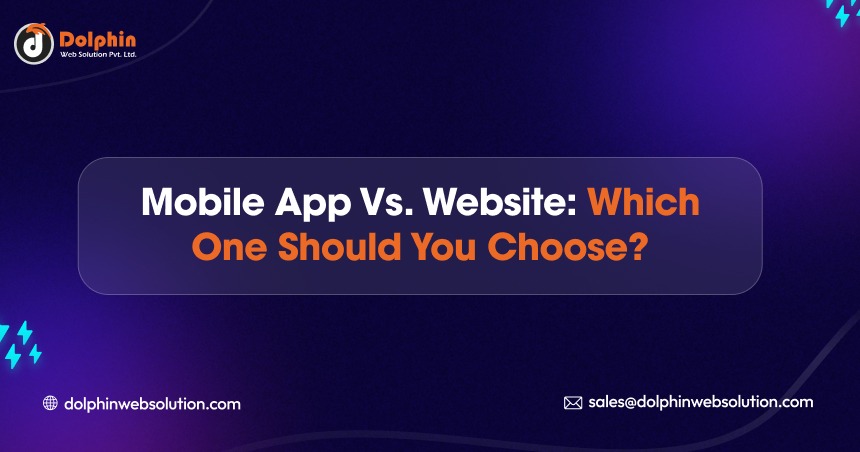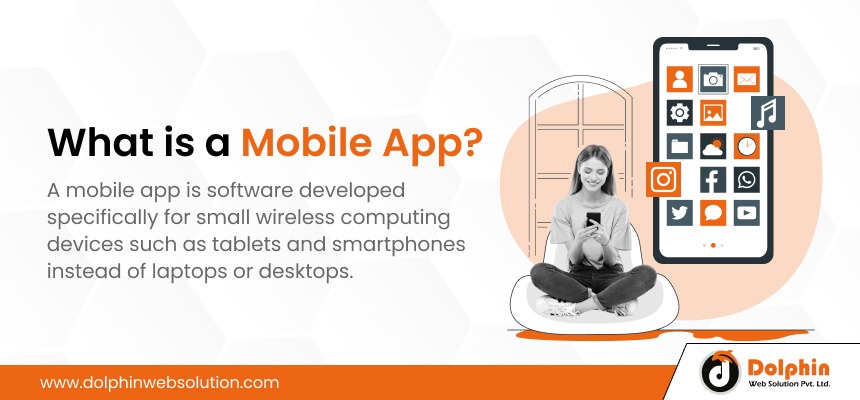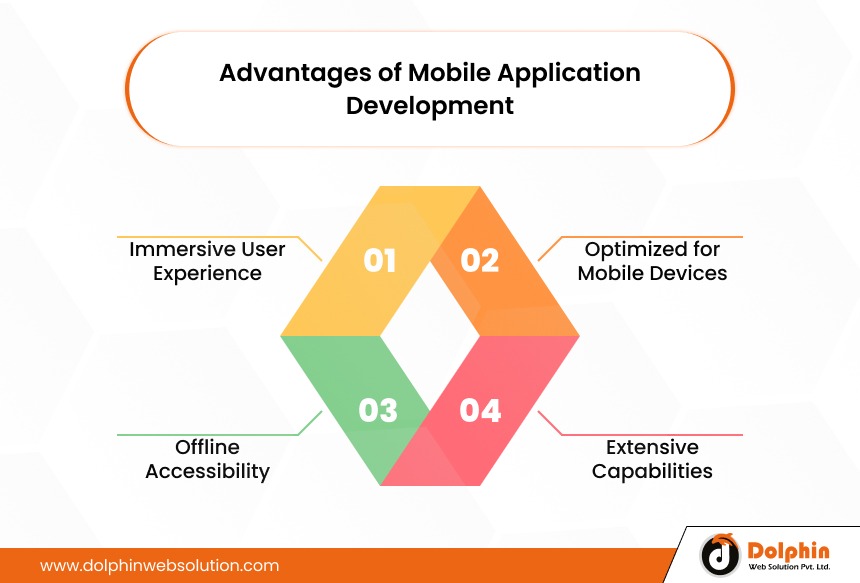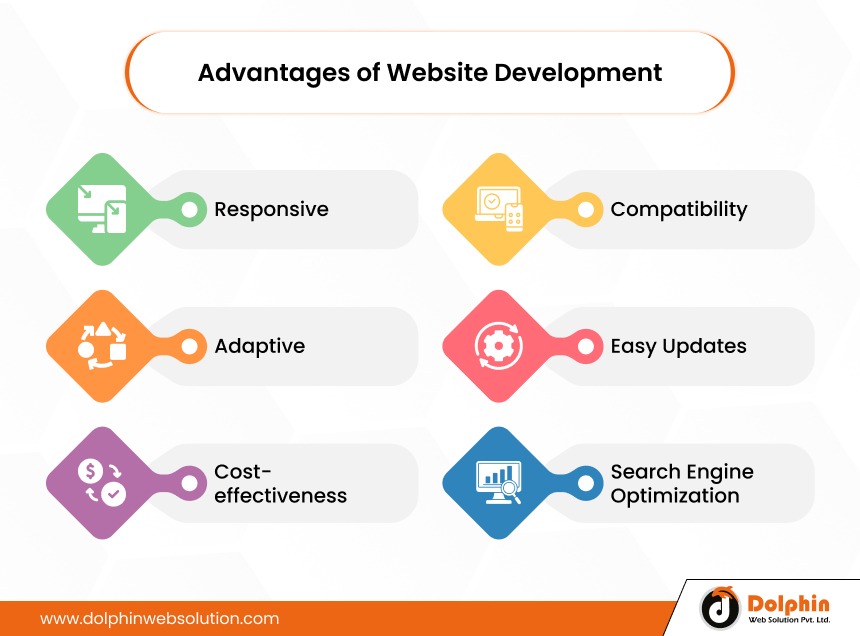Mobile App vs. Website: Which One Should You Choose?

Table of Contents
Summary :
In this growing digital era, your business must have a strong online presence, but you must also decide whether it would be feasible enough to have a mobile app or a website to reach out to its target audience. Making a selection between the two is a crucial decision as both are in trend and should not be taken lightly. In this blog, we’ll take a look at the differences between a website and a mobile app, including the advantages and disadvantages of each and the factors to consider when deciding between them.
Your customers access the Internet 24/7 to look for products and services worth exploring. An online presence helps you set your brand narrative and communicate with your audience. Whether you want to access a global audience or boost business credibility, it’s a must!
When planning to broaden your online presence, the first step is to decide between app or website development for your business. A website may be ideal for you if you want to access a larger audience. Having not enough capabilities to build two solutions at the same time for your enterprise prompts you to make a decision. A website is a group of content-rich web pages that permit users to access them through their browsers. They utilize state-of-the-art technology to work on any operating system and screen size, thus enabling them to reach a wider market base.
Websites usually need a stable internet connection; they are often less interactive than mobile apps.
Let us learn more about them in this blog post.
What is a Mobile App?

A mobile app is software developed specifically for small wireless computing devices such as tablets and smartphones instead of laptops or desktops. In some cases, mobile applications are grouped depending on whether they are web or native applications designed specifically for one particular platform. A third type is hybrid applications that combine features from both native and web-based applications.
Advantages of Mobile Application Development

1. Immersive User Experience
Another clear advantage of mobile apps is user experience. They are developed for a particular device in a specific OS environment. They use gestures plus native UI constituents to facilitate smooth navigation for users. If we compare them to websites, these applications seem more deeply engaging for end-users due to their full-screen design mode. For example, we tend to download and install applications that solve our particular problems quickly.
2. Optimized for Mobile Devices
Mobile applications are mostly designed to run on smartphones; hence, they generally give a very efficient user interface. This is so because such applications usually consider the size of screens and other integral features unique to smartphones.
3. Offline Accessibility
Mobile apps can be accessed offline, and users can use certain functionalities. This is greatly beneficial when you are in an area with no network coverage or have run out of your monthly data pack. This functionality is hard to find in websites, giving mobile apps an edge over them.
4. Extensive Capabilities
A mobile app is the best choice whenever you wish to use particular features contained in a device, including accelerometers. However, with the Information Technology sector (industry) rapidly advancing, with regard to providing users with the functionality they require and at a reasonable level of ease, regular mobile applications remain top and more effective than any other options.
Disadvantages of Mobile Application Development
Here are some of the main limitations of mobile application development:
- Mobile application development would cost more than websites as they are created specifically for a particular website. Also, if you want to make your app run on Android and iOS, you must hire cross-platform app developers, which would cost you even more.
- You will regularly need to update your app to new versions, perform bug fixes, upgrade to the latest Apple or Android systems, etc. This will require you to spend more on maintenance and upgrades.
- Mobile apps undergo a complicated and long approval process when launching on Android or iOS.
What is a Website?

A website is a collection of web pages or files containing various content that a particular business or person manages. With a website, companies can access a large audience and ensure compatibility with multiple devices.
Advantages of Website Development

1. Responsive
Websites can adapt to different screen sizes and look equally good on any device. They can scale up their components depending on your device. This ensures a consistent feel and performance across devices, which improves the overall user experience.
2. Compatibility
Consider compatibility before deciding on an app or website because this is among the key benefits of mobile websites, i.e., device and OS-agnostic. On the contrary, a mobile application would just work with one platform, hence necessitating a different team of experts to support other platforms (for instance, Android cannot run an iOS app). Consequently, these are two things: a mobile application operates on only one operating system while offering similar functionality to others it supports.
Another benefit of mobile web applications is that your clients need not install anything to use the service provided by the platform. In contrast, for mobile applications, one has to search for them on the Play Store, get a suitable download, and then install them.
3. Adaptive
Websites usually follow a static approach, using static layouts specifically designed for a particular operating system, screen resolution, or device. That is, a website identifies the device that a user is currently using to surf the web and then shows the layout designed for that device. This technique is more costly, as each layout is custom-designed and built based on the size of the device screen.
4. Easy Updates
Neglected attention aspects like updates are difficult to compare between websites and mobile applications. When a website update is uploaded to a server, it becomes available to visitors, while mobile app updates require time and are more complex.
Before the end user can access an update, it has to go through an approval process by Google or Apple. Depending on whether you upload it to the App Store or Google Play store, this process may last up to twenty-four hours from the time of submission.
5. Cost-effectiveness
As already mentioned, for different web app projects, there should be individual developers or even teams for every platform (depending on complexity level). If you want an application for different well-known operating systems, you need to employ specialists in this area since creation for iOS and Android varies greatly; they use unlike structures and architectures. In comparison, websites come with a single code base and work equally well on all devices, making them more cost-efficient.
6. Search Engine Optimization
SEO optimization is among the most significant features that can assist websites in their battle against mobile applications. It is an excellent means of increasing the number of leads generated through it and converting such leads into customers as well.
When potential buyers make particular queries using a search engine, your site appears during searches only if it is optimized appropriately. In other words, this type of optimization brings more leads to your site when searching for information or a specific product your business offers.
Disadvantages of Website Development
Here are some of the main limitations of website development:
- Users can’t access full-featured websites if they are offline. Only a previously viewed cached page can be accessed, but users can’t interact with any functionality in the offline mode.
- Websites need technical limitations as they are accessed over the browser, causing them a not-so-great user experience.
Which one is better for business: an app or a website?
When choosing between the two, the decision would depend on your business-specific requirements.
- User Experience: Websites run on all devices and OSs, making their UI/UX design limited. In contrast, mobile apps have device-specific features, convenience, and UI.
- Compatibility: Websites work equally well on devices, whereas mobile apps are created for a specific platform, requiring high maintenance and individual approaches for each version.
- Customization: Mobile apps allow you to experiment with customization through various widgets, personalized recommendations, push notifications, etc. On the other hand, websites need to offer great customization features.
- Offline use: Mobile apps allow you to access all data stored on your device, even offline. However, websites offer limited access to offline usage.
- Reach: Websites can be accessed by anyone with a stable internet connection. However, mobile apps require installation before they can be used.
Conclusion
The decision between mobile apps and websites would ultimately depend on your cost expectations and the functionalities you wish to provide your users. Businesses often opt for mobile app and website development to access more users.
At Dolphin Web Solution, we have a proven track record of mobile app development and website development. So, if we can help you make the right decision and make your idea a reality, then let’s talk! We are always ready to support you with all your development needs!

Hello!
Click one of our contacts below to chat on WhatsApp


